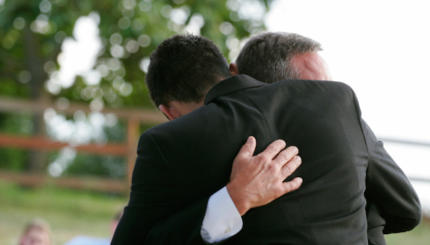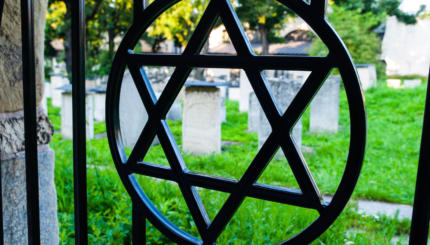The opportunity to eulogize someone is a daunting responsibility. When I began performing funerals I was often overwhelmed by the enormity of the task and always worried about properly honoring the deceased while remaining balanced, honest, focused and clear. With time, one develops experience and more insights about doing this properly. Furthermore, Jewish tradition offers valuable guidance and wisdom. I will try to share what I have learned with you here.
A eulogy, known as a “hesped” in Hebrew, is a speech given in honor of the deceased, which is usually said at their funeral or burial. These speeches may occur throughout the first year of one’s passing, in which case it is often referred to as an “azkarah” which means “remembrance.”
Eulogizing the deceased is an important ancient Jewish custom, dating all the way back to the patriarch Abraham, who eulogized his wife Sarah, “Abraham came to eulogize Sarah and to cry for her” (Genesis 23:2). From this verse, Jewish tradition has understood two goals of the eulogy:
- Eulogize (“Hesped”): Praise for the worthy qualities and achievements of the deceased.
- Lament (“Bekhi): Arouse the emotions, and a sense of grief and loss, in the listeners.
Judaism takes very seriously the obligation to eulogize the deceased appropriately. The Bible tells us that the Jewish people were punished with famine for not giving King Saul a sufficiently respectful eulogy (Samuel II, 21:1). Indeed, in Talmudic times it was customary to pay a large sum to hire expressive eulogists and wailers for funerals.
Jewish law emphasizes that eulogies should be both truthful and praiseworthy. One should not lie about the qualities of the deceased or make obvious exaggerations, but it is proper to enhance their positive attributes (Shulchan Aruch Yoreh Deah 344:1). Indeed, as commentaries on the Code of Jewish Law (such as the Bach and the Taz) have opined, it is better to slightly overestimate the positive sides of the deceased than to underestimate them. The rationale they give for this is that, since people often conceal many of their qualities, even those eulogizing the individual may be unaware of them. In addition, at this emotionally charged time, it is best to maintain peace and the dignity of the deceased and their family. Indeed, all people are worthy of being praised and eulogized in some positive manner, and, as a rabbi who has officiated at a number of funerals, I have found that there is something good that can be said about everyone.
When composing a eulogy, the goal is to praise the deceased, evoke an emotional reaction from the listeners, inspire listeners to improve their own lives by finding the qualities mentioned within themselves, and to consider their own legacies. While funerals often have a religious tone, the goal of a Jewish eulogy is not to evangelize, but to honor the deceased, while also tending to comforting the mourners and enabling them to cope with their loss. One should thus be sensitive to the specific needs of the mourners and, if appropriate, offer support and some guidance on facing the existential questions that may rise at this time.
Who Is the Eulogy For?
The Talmud (Sanhedrin 46b) debates if the purpose of a eulogy is to honor the deceased (either by elevating his or her status in the eyes of the mourners or by actually comforting his or her soul, who we believe is listening to the eulogy), or if it is intended for the benefit of the mourners. While the eulogy should serve both purposes, Jewish law prioritizes the deceased, and thus if he or she had requested not to be eulogized, that preference should be respected. That notwithstanding, eulogies can be very meaningful for mourners, providing comfort, putting their own lives in perspective, reminding them of the good qualities of the deceased, and facilitating a recognition of the finality and enormity of their loss.
Who Should Deliver the Eulogy?
Anyone who is aware of positive attributes of the deceased can deliver a eulogy, or share their insights with the person who will be doing so. Often the rabbi who conducts a funeral will deliver a eulogy. It is beneficial to have a rabbi officiate, because they will be aware of the various customs that arise, and has the professional experience to be able to calmly and sensitively guide the family through such an emotional and stressful time. If the rabbi didn’t know the deceased, it is ideal for as many close friends and family members as possible to meet with them to share stories about the deceased with as much detail as possible. It can be beneficial to coordinate with the rabbi who will be speaking, what aspects of the deceased’s life they will be covering, and if they are open to guests sharing extemporaneous eulogies.
Can a Eulogy Be Given Extemporaneously?
Even if one is an experienced public speaker, the pressure and emotions associated with delivering eulogies can make them challenging. It is thus best to prepare in advance and to either speak from notes or read a fully written speech. If it is too difficult for you to deliver the eulogy yourself, it is perfectly acceptable to share your notes with someone else who can read it on your behalf, or to share some insights or memories with the officiating rabbi.
Some mourners are not sure who might want to share some thoughts at the funeral and thus open it up for anyone in attendance to speak. This is acceptable if it is what the family prefers, but I have found that it sometimes gets out of hand and there may be people who would not have otherwise been asked to speak or who say inappropriate things. I thus generally encourage people to share their thoughts on another occasion, rather than opening it up for anyone to speak at the funeral, but it is a matter of personal preference for the family.
What Should the Eulogy Include?
Some of the themes to cover in a eulogy include the deceased’s life story, legacy, accomplishments, values, positive and unique character traits, love of family and friends, and devotion to community and Judaism. While interviewing family and friends to learn about the deceased, it is important to ask open-ended questions, and allow them to talk at length, while listening carefully and taking notes. Some good questions to ask include:
- “Tell me about their family of origin and childhood.”
- “How did they meet their spouse?”
- “Tell me about him or her as a spouse/friend/parent/child etc.”
- “Tell me about his or her hobbies/interests/education/occupation/Jewish connection or synagogue life/community involvement or volunteering/distinguishing characteristics.”
It is also important to get a complete list of immediate relatives so that nobody is left out if names are mentioned. When delivering a eulogy one should be very careful not to reveal details that might be embarrassing to the deceased or their family. This can include private statements that were made to you but were not intended for the public to be aware of; details of previous marriages or relationships; improper or illegal activities, etc. A good rule of thumb is directly ask family members before sharing information that you are not absolutely sure they would be comfortable with. The tone of a eulogy should be serious and respectful, though when appropriate some gentle humor can be acceptable and sometimes even comforting.
How Long Should a Eulogy Be?
It is important to keep eulogies relatively brief. As a rule of thumb I generally try to keep eulogies well under 10 minutes, especially if there will be many speakers, or if the eulogies will be delivered at graveside, in which case people may be standing and/or in poor weather.
Sign up for a Journey Through Grief & Mourning: Whether you have lost a loved one recently or just want to learn the basics of Jewish mourning rituals, this 8-part email series will guide you through everything you need to know and help you feel supported and comforted at a difficult time.
Looking for a way to say Mourner’s Kaddish in a minyan? My Jewish Learning’s daily online minyan gives mourners and others an opportunity to say Kaddish in community and learn from leading rabbis.
Talmud
Pronounced: TALL-mud, Origin: Hebrew, the set of teachings and commentaries on the Torah that form the basis for Jewish law. Comprised of the Mishnah and the Gemara, it contains the opinions of thousands of rabbis from different periods in Jewish history.



